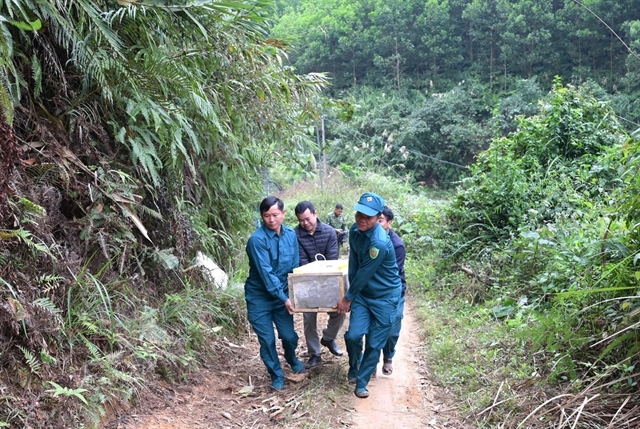

Nguyễn Cường is a songwriter who always dresses up as a Western cowboy. His songs are mostly about the Central Highlands. He has just released his first album.
 |
| Divo Tùng Dương (left) and veteran songwriter Nguyễn Cường at a press conference about their joint album Tùng Dương Sings Songs by Nguyễn Cường. — Photo courtesy of the organiser |
Nguyễn Cường is a songwriter who always dresses up as a Western cowboy.
His songs are mostly about the Central Highlands.
He has just released his first album.
Nguyễn Cường is seventy-five years old.
Born in Hà Nội’s Old Quarter, songwriter Nguyễn Cường is most famous for his songs about the Central Highlands region. The 75-year-old has just released his debut album entitled Tùng Dương Sings Songs by Nguyễn Cường. The album, which is a joint production with divo Tùng Dương, features 10 songs that were inspired by the Red River Delta region and its rich culture. The veteran songwriter, who always dresses up like a Western cowboy with a cowboy hat, jeans and denim shirt, talks with Thúy Hằng about his newly born ‘offspring’ and his simple life with little need for money.
Inner Sanctum: How did you select the songs for your debut album?
This is a joint album between me and singer Dương so we decided to present songs that both of us like. Anyway, all my songs are influenced by different Vietnamese folk tunes, especially the ones of the Central Highlands and Red River Delta regions. In our album, there are songs reflecting the tunes of ca trù (ceremonial singing), while others echo the tunes of tuồng (classical drama).
My songs are very deliberate when it comes to the singer, listener and even the music arranger. Each song is filled up with a lot of energy and emotion. My advice is that you should not listen to more than two of my songs at a time because my music is not meant for relaxation. If you want to relax, don’t think about my music.
Inner Sanctum: The ca trù influenced songs Mái Đình Làng Biển (Fishing Village’s Communal House) and Nét Ca Trù Ngày Xuân (The Spring Tunes of Ca Trù) seem to be the most ‘relaxed’ ones, aren’t they?
The whole album has been remixed in rock style – a fusion rock which is combined with folk tunes. Especially through Dương’s voice, which is a bit weird, a bit unusual, and very seductive, those songs, including two ca trù-influenced ones, once again challenge the listeners. I think those who can get used to this new remixed version may feel relaxed.
Inner Sanctum: Why did you decide to make this album?
I think it is fate. Dương has performed successfully songs by other musicians such as Trần Tiến and Lê Minh Sơn. By chance, one day, when I heard Dương singing my song Hò Biển (Sing Out for Fishing), I know that I had found another “true friend” in music. Before Dương, I was lucky to meet two others – singers Y Moan and Siu Black. These two children of the Central Highlands are the best to perform my songs about that imposing land.
Dương can satisfy my requirements for his ability to absorb and express fully the songs’ spirit. Since then, we have started to work together.
I composed Hò Biển in 1973 after the Paris Peace Accords had been signed and the Americans stopped blockading North Việt Nam, that’s why the lyrics include the words “storm is over” and “warm sunlight has exposed”. First presented successfully by singer Quang Phác in 1974, the song then has been sung by several other singers. However, the performance by Dương is the one that makes me happiest.
Inner Sanctum: Is there any other song in the album which has waited until now to be publicised?
That is the song Bi Ca Trọng Thủy (The Elegy of Trọng Thủy), which echoes the tunes of tuồng (classical drama). It was completed such a long time ago that I even don’t remember exactly the date. In my opinion, the legendary love of Mỵ Châu and Trọng Thủy can be compared to that of Romeo and Juliet. The singer who first sang this song failed to satisfy me because he didn’t have enough of the inner energy to expose the soul of the song. So I continued to keep the music manuscript in my table drawer for years.
I think there are several processes before a song can be presented to public. It requires a music band, music arrangement, and most important – a suitable singer. Without these key factors, the songs remain in the form of the manuscript. That is also my big concern because without a proper singer, my songs can’t be introduced perfectly to music lovers.
For example, I composed the song Nét Ca Trù Ngày Xuân (The Spring Tunes of Ca Trù) in 1980 and many singers sang this song before. However, through Dương’s seductive and emotional voice, the song has become gorgeous.
I know many songwriters who have to put hundreds of song manuscripts on the shelf because they can’t find any suitable singer to perform them. That’s their misery. Myself, I’m happy because most of my favourite songs have been performed. I have Y Moan and Siu Black – two singers who perform my songs about the Central Highlands very successfully. And now I have Dương who is able to present perfectly my songs about the Red River Delta region. I want to say “thank you” to him.
Inner Sanctum: Many songwriters have been requested by singers to compose songs exclusively for them. Have you ever gotten such a request?
No, I’ve never accepted that kind of request. However, I sometimes have been requested to compose some piece for localities. And I just accept their request if those areas have certain “ingredients” for my songs. The ingredients are their specific regional culture.
All my songs were inspired by Vietnamese culture. It can be said it’s our rich culture urging me to compose songs. It’s the Central Highlands’ gong, the Bắc Ninh quan họ (love duet) singing and the nation’s legendary ancestors Hùng Kings that are the endless inspiration for my compositions.
Inner Sanctum: You said that your songs can be demanding of listeners. How does that affect your royalties?
Honestly, I don’t care how much money I can earn from my songs. I don’t have the need to spend much money. I’ve witnessed many people living lavishly while many people in rural and isolated areas are living with a lot of hardships. I don’t have a bicycle, a motorbike or a car. To travel in the city, I take a bus, so I just need some pocket money. My daily need is to swim, to exercise, to meet my friends, and to eat properly to avoid gaining weight. Another essential need is to write new songs. Life is beautiful. – VNS
GLOSSARY
The 75-year-old has just released his debut album entitled Tùng Dương Sings Songs by Nguyễn Cường.
A debut is a first performance.
The album, which is a joint production with divo Tùng Dương, features 10 songs that were inspired by the Red River Delta region and its rich culture.
If something inspires you it makes you want to go out and do something positive in the world.
The veteran songwriter, who always dresses up like a Western cowboy with a cowboy hat, jeans and denim shirt, talks with Thúy Hằng about his newly born ‘offspring’ and his simple life with little need for money.
Offspring means child, or children.
Anyway, all my songs are influenced by different Vietnamese folk tunes, especially the ones of the Central Highlands and Red River Delta regions.
If folk tunes influence the songs, they play a part in making them what they are
My songs are very deliberate when it comes to the singer, listener and even the music arranger. Each song is filled up with a lot of energy and emotion.
Deliberate means “on purpose”.
The whole album has been remixed in rock style – a fusion rock which is combined with folk tunes.
A remix is a different version of a song.
A fusion is the joining of two things together to make something new.
Especially through Dương’s voice, which is a bit weird, a bit unusual, and very seductive, those songs, including two ca trù-influenced ones, once again challenge the listeners.
Seductive means attractive.
I think it is fate.
Fate is what happens in the end, whether things are planned that way or not.
These two children of the Central Highlands are the best to perform my songs about that imposing land.
Imposing means spectacular.
Dương can satisfy my requirements for his ability to absorb and express fully the songs’ spirit. Since then, we have started to work together.
Requirements are things that are wanted and needed.
I composed Hò Biển in 1973 after the Paris Peace Accords had been signed and the Americans stopped blockading North Việt Nam, that’s why the lyrics include the words “storm is over” and “warm sunlight has exposed”.
Lyrics are the words of a song.
That is the song Bi Ca Trọng Thủy (The Elegy of Trọng Thủy), which echoes the tunes of tuồng (classical drama).
Echoes are sounds that are repeated.
In my opinion, the legendary love of Mỵ Châu and Trọng Thủy can be compared to that of Romeo and Juliet.
Things and characters that are legendary are written about and spoken about in stories.
For example, I composed the song Nét Ca Trù Ngày Xuân (The Spring Tunes of Ca Trù) in 1980 and many singers sang this song before. However, through Dương’s seductive and emotional voice, the song has become gorgeous.
To compose a song means to write its words and its music.
And I just accept their request if those areas have certain “ingredients” for my songs.
The ingredients of something, like a song or a dish, are the things that go into making it.
It’s the Central Highlands’ gong, the Bắc Ninh quan họ (love duet) singing and the nation’s legendary ancestors Hùng Kings that are the endless inspiration for my compositions.
Your ancestors are your parents, your grandparents, your great grandparents and so on.
I’ve witnessed many people living lavishly while many people in rural and isolated areas are living with a lot of hardships.
Lavishly means comfortably and wealthily and showing it off.
Isolated means far away from anywhere else.
WORKSHEET
Find words that mean the following in the Word Search:
c | i | m | o | y | t | u | j | s | g | u | d |
a | t | b | s | b | l | b | d | n | f | e | e |
d | p | h | i | p | a | r | i | s | o | c | l |
v | a | b | c | c | g | y | r | t | u | o | t |
i | h | v | l | o | a | r | s | z | r | l | a |
c | e | e | h | u | w | b | t | h | c | e | a |
e | d | v | i | o | e | b | d | g | e | b | p |
g | f | u | c | e | b | o | o | k | a | c | m |
b | r | q | v | h | l | x | d | y | r | f | m |
u | i | w | c | s | i | n | g | e | r | s | r |
ANSWERS: 1. Paris; 2. Delta; 3. Advice; 4. Cowboy; 5. Singers.




